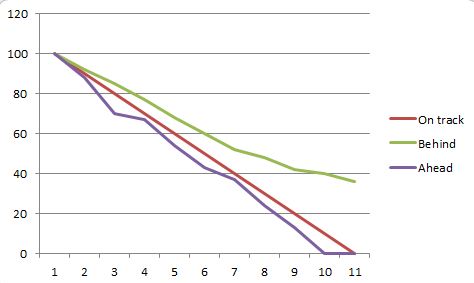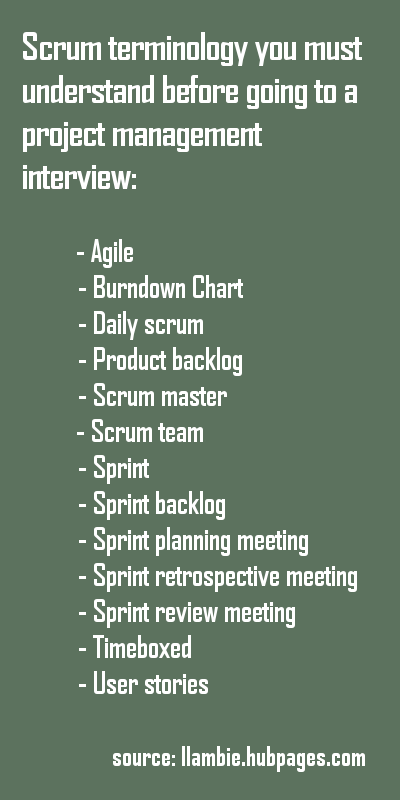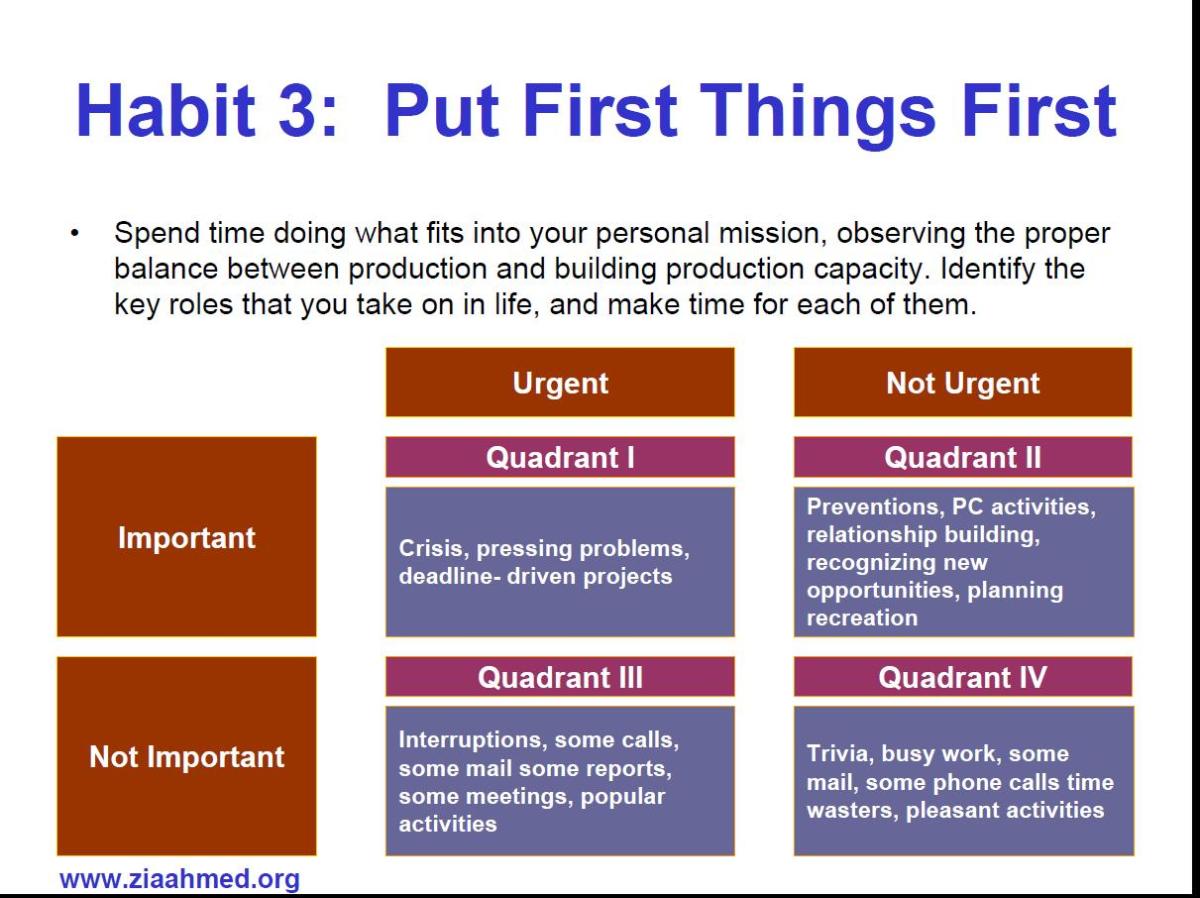The 10-Minute Scrum Terminology Recap, In Preparation For A Job Interview

Scrum Project Management
Scrum agile is fast becoming one of the most sought-after skills around for a project manager. However, if you are going for a project management interview and the job specification has mentioned Scrum, then you need to be ready to answer questions. Here's a cheat's guide to Scrum, with a breakdown of the main terminology and what it means.
Agile
What does it mean: Agile is the umbrella term for a basic principle of software development. Agile development is small, incremental and repetitive. It is in direct contrast to the more traditional waterfall method. Scrum is a particular technique for applying the principles of Agile to a project.
How this might get asked in an interview: Sometimes, people inter-change the word agile and scrum, even though they mean different things. So if you are asked what you know about agile, explain that you have experience in a particular agile technique, known as scrum.

Burndown Chart
What does it mean: A burndown chart is a simple but very effective technique that is used to keep track of work and to determine if its going to meet upcoming deadlines. For every sprint, you calculate the amount of time available, and the amount of work to be completed during that time. Each day, you plot on a graph how much you have completed. In an ideal project, what you should get is a nice downward line heading towards zero by your last project day.
How this might get asked in an interview: You might get asked if you've ever produced one, so come prepared to the interview with a copy of the burndown chart from your latest project (minus any commercially sensitive data)

Daily scrum
What is it: A daily scrum meeting is a short, stand up meeting arranged for the same time every day. The scrum team attends, and they each take it in turns to answer three questions:
- What did I complete yesterday?
- What do I plan to do today?
- Is there anything standing in my way?
There is a strict 15 minute time-frame for this meetings, to ensure they remain focused.
How this might get asked in an interview: You may get asked if you run scrum meetings in your current projects. If you don't, be ready to justify why.
Product backlog
What is it: A project is delivery of a product. That product can be a service, or a tangible item, but it is always a product. The product backlog is a list of everything that needs to be produced on the project to create that product. It takes time to properly list all these for a project, but by doing so the team has a clear understanding of every item - big and small, that needs to be achieved.
How this might get asked in an interview: You may be asked what approach you take when creating a product backlog, so be sure to think this through in advance and prepare a solid answer.
Scrum Master
What is it: Scrum projects don't have project managers; they have scrum masters. A scrum master is the leader of the team who will be delivering the project. They are not called a manager, because there role is far more about collaboration and team effort than delegation. They are the gatekeepers of scrum for a project, and need to make sure that the scrum approach is adhered to throughout.
How this might get asked in an interview: You are likely to get asked about your experience in acting as a scrum master on a project. If you don't have direct experience, think about times when you've interacted with a scrum master on a project instead.
Scrum team
What is it: The scrum team is the full group of people who will be carrying out the project. You may remember during your Scrum training the analogy of the Pig and the Chicken. Well, the scrum team are all those committed to the project. The pigs, if you will.
How this might get asked in an interview: You might be asked to give examples of the types of roles that might appear in a scrum team. You may also be asked about when you've worked with a scrum team, and how you found the experience.
Sprint
What is it: One of the unique features of scrum is that is breaks down the entire work of the project into fixed discrete periods of work. These are known as sprints. A sprint is a fixed time period, anywhere from 1 to 4 weeks in length, and a project may have a number of sprint. Each individual sprint includes a detailed planning and review stage, and it is designed to keep the work focused, achievable and manageable.
How this might get asked in an interview: You may get asked to explain what a sprint is. The interview might also want to find out some information about how you have designed and managed sprints in the past.
Sprint backlog
What is it: In each sprint, the team must determine what work to complete. This list of work becomes known as the sprint backlog. It contains a large list of items, with time estimates, that the team feel they can complete in that specific sprint.
How this might get asked in an interview: You may get asked about what tools you use to capture and monitor a sprint backlog.
Sprint planning meeting
What is it: As mentioned in the previous section, every individual sprint includes a planning element. Rather than plan the entire project in much detail at the start, detailed planning is broken down into sprints when managing a scrum project. So this planning takes place in a meeting and it involves the entire team. Everyone responsible for undertaking the work are offered an input into the plan.
How this might get asked in an interview: An interviewer may ask you how you typically conduct a sprint planning meeting, and they may follow this up with further questions, such as how you get a team involved and enthusiastic about the planning.
Sprint retrospective meeting
What is it: The other side to a sprint is the retrospective meeting. Scrum makes a point of capturing all the valuable lessons that can be learned from a project, but which too often get forgotten about. These lessons get put into action straight away of course, because following a retrospective will be the next sprint in the project. So it is an opportunity for improvement as the project goes on.
How this might get asked in an interview: You might be asked to give your thoughts on sprint retrospectives and whether you believe there is any benefit to them.
Sprint review meeting
What is it: It may be easy to get confused between a sprint review and a sprint retrospective, so this is the difference: a sprint review includes a wider audience than the team (e.g. management) and rather than looking at aspects such as lessons and opportunities for improvement in the next sprint, the review looks at what has been achieved on the sprint, what the product now looks like, and how much progress has been made.
How this might get asked in an interview: You may get asked how you would run a review meeting, and how you would answer any challenging questions brought up in the meeting.
Timeboxed
What is it: Timeboxed is effectively a principle of scrum, and you may see the phrase used in scrum training. Timeboxed essentially means that all activity takes place within a fixed period of time: for example, a sprint is run for a fixed period, and a daily scrum is a fixed period. These are both 'timeboxed' in scrum terminology.
How this might get asked in an interview: You may be asked if you are familiar with the term.
User stories
What is it: The purpose of user stories is to keep focus on the quality of the end product from the user's perspective. Traditionally, requirements have been captured in a list format and a solution architecture has been designed to meet them, whereas user stories create a narrative based on how the end customer will find value in the product.
How this might get asked in an interview: You may be asked if you use user stories on your projects, and if you don't, what alternative techniques you use instead. Remember to bring along examples to the interview if you think they demonstrate a good example of how you run your projects.





